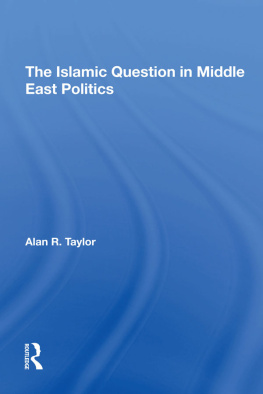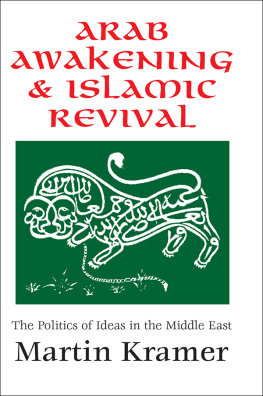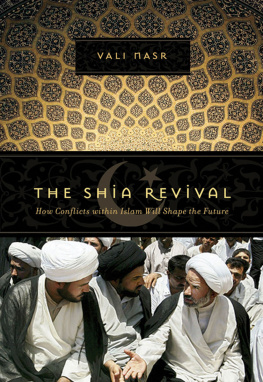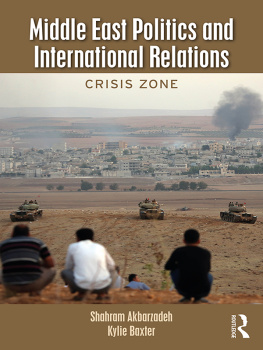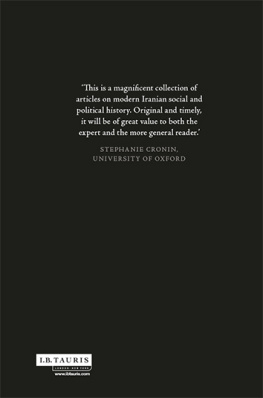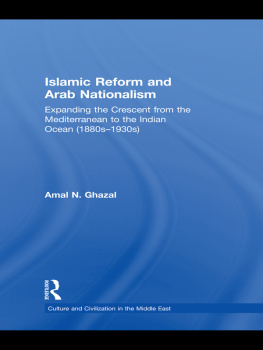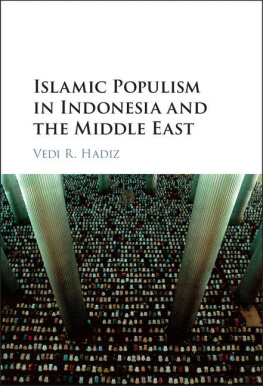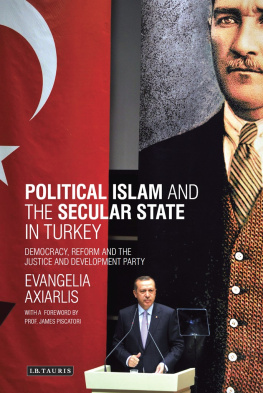To Hisham Sharabi My first mentor and friend of many year
First published 1988 by Westview Press
Published 2019 by Routledge
52 Vanderbilt Avenue, New York, NY 10017
2 Park Square, Milton Park, Abingdon, Oxon OX14 4RN
Routledge is an imprint of the Taylor & Francis Group, an informa business
Copyright 1988 Taylor & Francis
All rights reserved. No part of this book may be reprinted or reproduced or utilised in any form or by any electronic, mechanical, or other means, now known or hereafter invented, including photocopying and recording, or in any information storage or retrieval system, without permission in writing from the publishers.
Notice:
Product or corporate names may be trademarks or registered trademarks, and are used only for identification and explanation without intent to infringe.
Library of Congress Cataloging-in-Publication Data
Taylor, Alan R.
The Islamic question in Middle East politics / Alan R. Taylor.
p. cm.
Bibliography: p.
Includes index.
1. Islam and politicsMiddle East. 2. Middle EastPolitics and
govemment1945 . 3. Islamic fundamentalismMiddle East.
I. Title.
BP63.A4M538 1988
320.50956dc19
87-27139
CIP
ISBN 13: 978-0-367-29327-7 (hbk)
The intention of this book is to develop to its logical conclusion a particular interpretation of the secular nationalist and Islamic neofundamentalist responses to the decline of traditional sociopolitical order in the Middle East. My primary argument is that secular nationalism as an institution borrowed from the West has in many respects failed to create a more viable political system in part because it was insufficiently liberal; however, the attempt to establish a better order by resort to a radical repolitidzed Islam has also been unsuccessful because it did not include in its doctrine the humanistic aspects of the Islamic tradition. These two movements will be examined in depth, with particular reference to the relevance of Islam in the present situation. The Islamic question in Middle East politics concerns what role Islam can and should play in the reconstruction of the areas ideological orientation and institutional framework. This is an especially important issue, given the current dislocation in the coherence of existing belief systems. The way it is addressed will have repercussions of major consequence.
The book provides a useful overview of the origins, development, and eventual encounters of secular nationalism and the various manifestations of the Islamic reform movement. The respective ideological systems will be analyzed in some detail, along with a history of relevant events. The major focus, however, will be on the elaboration of the interpretive theme. The scope of the book is restricted to the Middle EastTurkey, Iran, and the Arab states.
The methodological approach stresses historical analysis. A number of premises underlie the application of this technique to this particular topic. The first is that the modern reconstructionist movements in the Middle East have been dealing either affirmatively or negatively with the Islamic heritage, the historical base of the areas culture. The trauma of modernization stems partly from ambivalent attitudes toward the powerful influence of Islamic tradition, which shaped the past and maintains continuity in the present. Though it is still a major determinant of behavioral patterns, Western modes of thought and action have also become part of the system of social dynamics and are regarded by many as more useful and appropriate in the contemporary world. The interaction of tradition and modernization is best understood through the use of historical methods, though the topic also falls within the domain of the cultural anthropologist.
Another premise is that the changes in social, economic, and political structures brought on by the colonization of the Middle East had a major impact on the areas orientation. The dislocation of traditional class roles and the dramatically altered relationship with the West uprooted the old system of loyalties, authority, and collective goals and replaced it with a new set of values and priorities. A historical approach is the most appropriate methodology for analyzing this kind of transition because it emphasizes the interrelationship of past and present and of events and culture.
The final premise is that the historical approach is particularly useful in interpreting the symbols and myths through which individuals and groups explain to themselves what they believe in and what they are putting into action. This approach is naturally disposed to looking at the entirety of human experience as opposed to a particular dimension. The ideologies of secular nationalism and the various forms of Islamic reconstructionism represent responses to a historical development requiring a reassessment of tradition and a consideration of innovation. This is a very disturbing process psychologically and leads to formulations about Islam and Westernization that are often both subjective and selective. A byproduct of the modernization crisis, such belief systems can be evaluated qualitatively only by reference to concepts that originated in other times or places and were then reinterpreted to address problems arising from contemporary circumstances in the Middle East. Because it concerns change and the response to it, the entire process is by nature historical.
With respect to the terminology used for contemporary Islamic movements, Islamic modernism connotes the school of thought associated with the late nineteenth-century Egyptian reformer, Muhammad Abduh. Though advocating an Islamic revival inspired by the model of early Islam, this Islamic modernism was also cosmopolitan in orientation because its founders had been influenced by the European intellectual currents of the time. Islamic fundamentalism refers to the conservative approach to reform, usually literalist and puritanical, exemplified by the Wahhabi movement and the subsequent Saudi monarchy in the Arabian Peninsula. Islamic neofundamentalism is used interchangeably with Islamic resurgence or Islamic militancy to refer to the more recent movement that in most cases seeks to repoliticize Islam and establish an Islamic government, while calling for the eradication of most or all Western cultural and political influences in Islamic societies.
The transliteration of words and names in Middle East languages represents a combination of common usage and a simplified version of the academic method. Arabic, Persian, and Turkish words and names are generally spelled in the manner used by contemporary scholars in those languages but without diacritical marks or nonphonetic endings. Popular spellings have been employed for such common names as Abdul Nasser, Hussein, and Maghreb. If individuals cited prefer a particular transliteration of their personal names, such as Mohammed, these are also used in referring to them.
I thank Professor John O. Voll, Christopher S. Taylor, Dr. George Atiyeh, Dr. Mohammad Hasan Hosseinbor, and Malise Ruthven for their kind assistance in reviewing the manuscript and making helpful suggestions.
Alan R. Taylor
1
Origins of the Islamic Question: An Overview
The emergence of militant, neofundamentalist Islam as a significant political force in the Middle East following the 1967 war has provoked a variety of reactions and attempts to explain its ultimate meaning. Within the region, apologists and critics of the resurgence movements have developed elaborate arguments to support or condemn their activities and doctrines. In the West, the public, the press, and even most governments have not gone far beyond the stage of characterizing the militants as a Middle Eastern version of the World War II Japanese kamikaze pilots, deemed hostile and dangerous because of their dedicated fanaticism. Scholars in several countries have been trying to develop more sophisticated interpretations.

